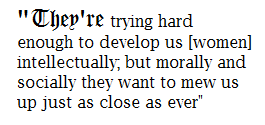(image taken from www.johnsweeney.co.uk)
This book examined the direct negative side of Empire in Burma in the early 1940s. The quotation I've chosen expresses what is finally beginning to change about how people consider various Western Empires. Attitudes are slowly but surely beginning to change in opposition to the very notion of Empire, and this is the only way we can move forward away from the heinous crimes which occurred under this hierarchical system.
Grace, schoolteacher to 62 half-caste orphans in Burma, realises that things are getting more dangerous as invasion strikes and she, alongside the children, need to leave. However, the schoolmistress refuses, and Grace must acquiesce to her decision. Moreover, these half caste orphans, the result of lusty imperialist soldiers enacting their desires, are outcast from society, and refused help because of their race on a seemingly never-ending basis.
Finally, Grace gets her way, and the entire school packs provisions and attempts to leave, but is it too late? Gone are traditional methods of getting away from Burma and there is no choice but to commence a long bus journey on a decrepit old vehicle which is never going to last the entire journey. When Grace meets Jem, it seems as though things may just work out, and her and the children will survive, but when tragedy strikes Grace is going to be forced to question everything she's previously believed. Especially when they are rescued by a group of elephant herders and begin to understand these beautiful but potentially deadly creatures.
This was a truly touching novel. This expressed for me in a better way than anything I've ever read just how debilitating it is for someone who is prejudiced against by people even during times of emergency. It speaks out about the blind inhumanity people can be reduced to. The fact that John Sweeney spent 12 years with this novel in the process of being written really highlights just how much thought is put into every step of the journey Grace and her orphans took. Moreover, it is inspired by a true story; if you want to learn more about this, check out Sweeney's explanation here.
Have you read it? What did you think?
Steph x

























